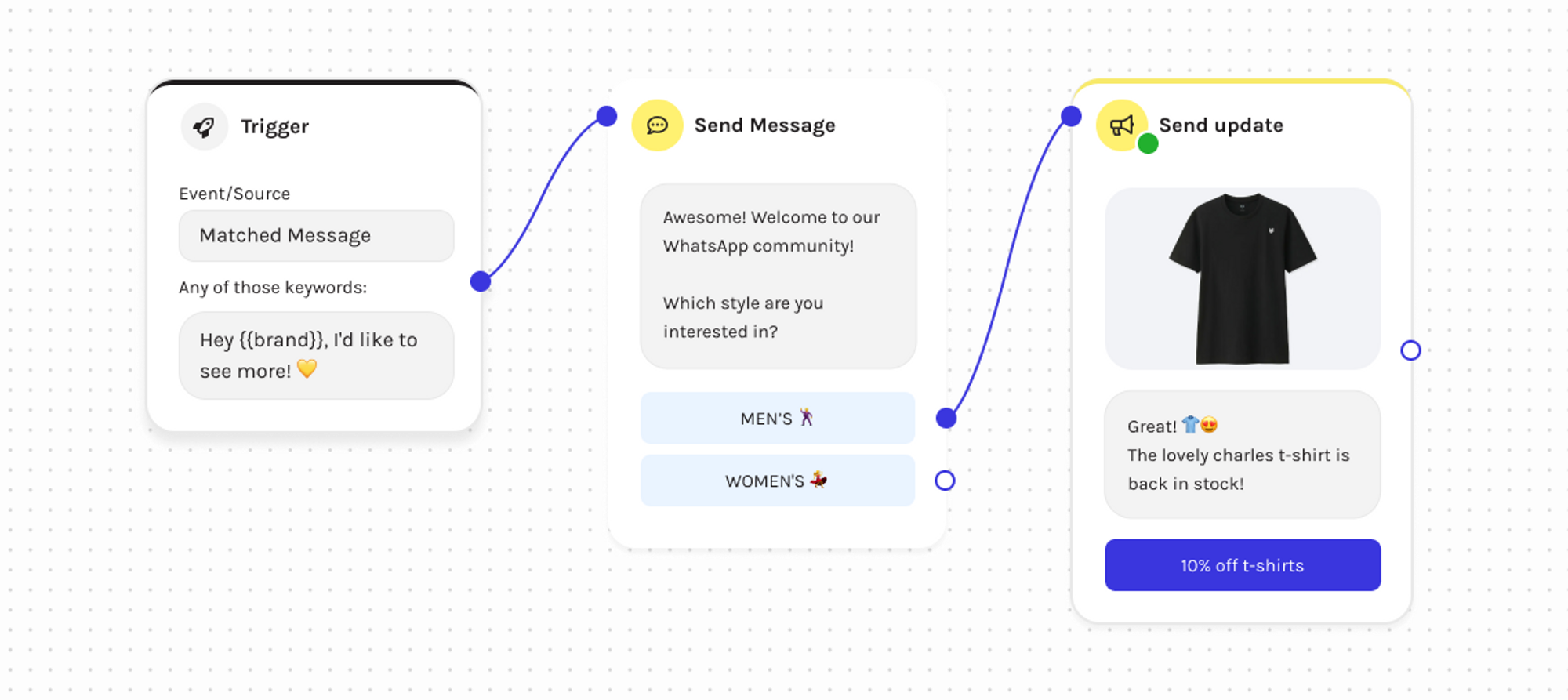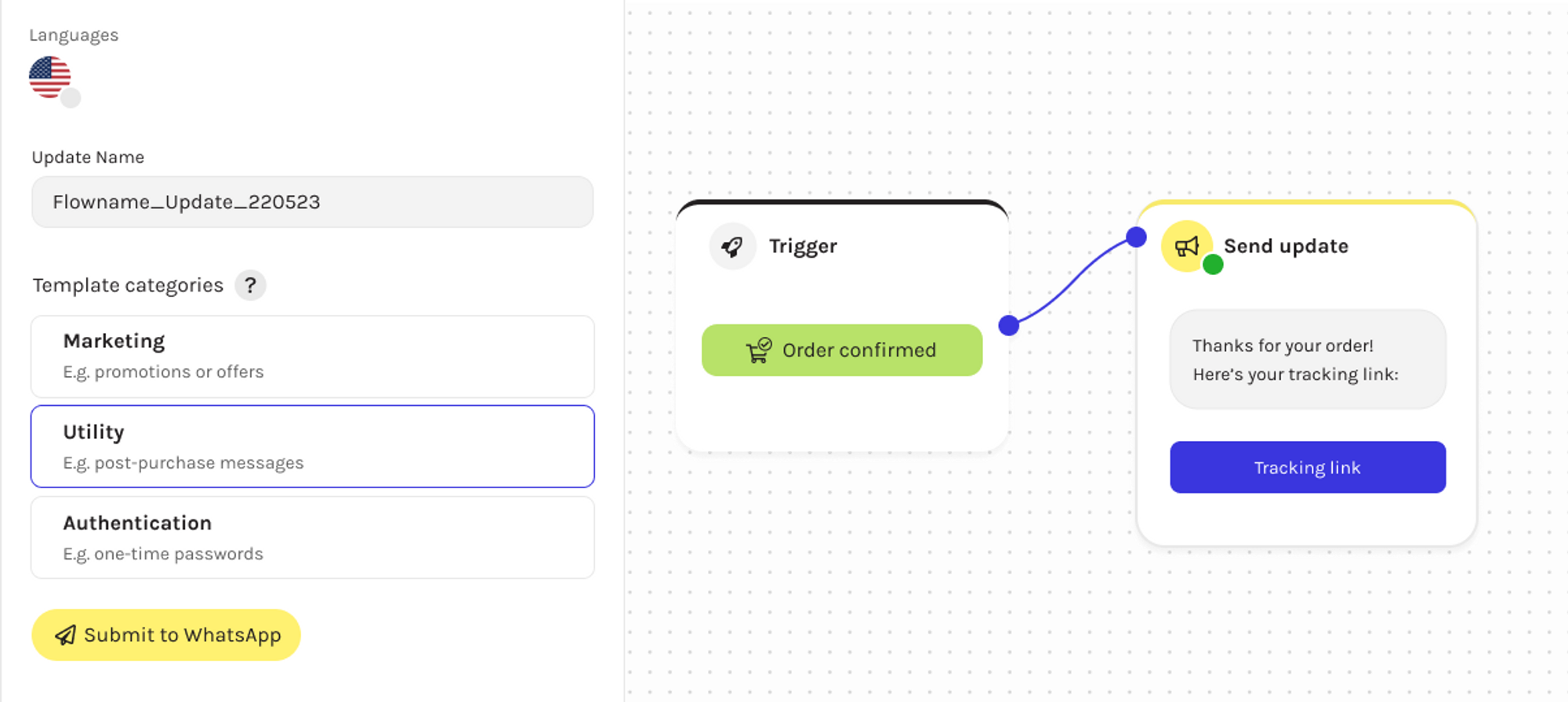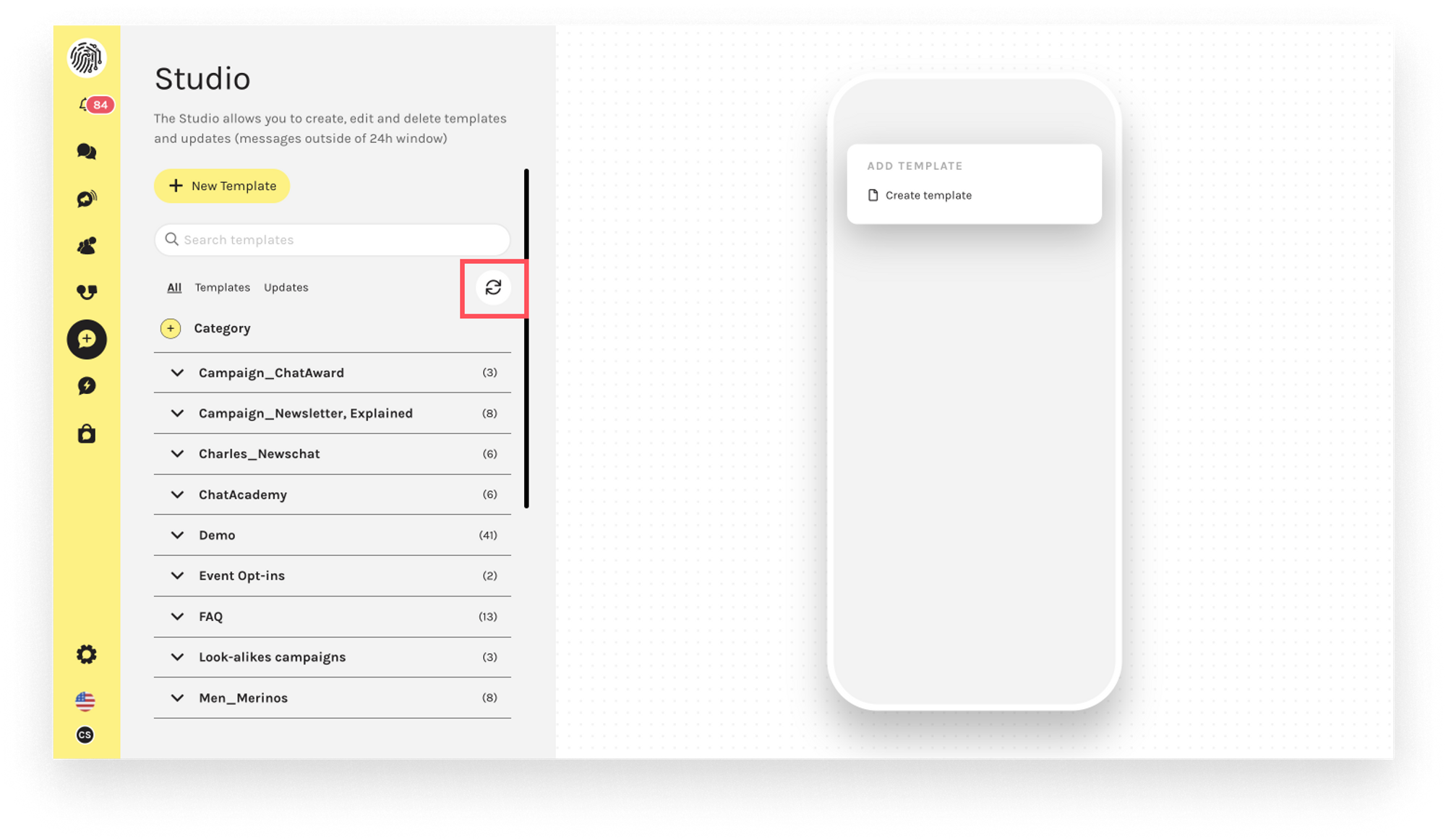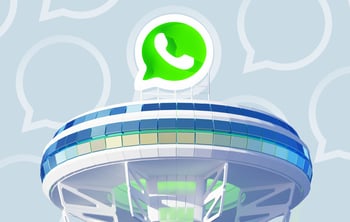By Maxine Hess
Writer | WhatsApp marketer | Creative
News
,Guides
How much does it cost to use WhatsApp Business? What are the conversation types? We explain WhatsApp Business API pricing, the extra costs involved and what's new since June 2023.
WhatsApp is different to email in many ways (see marketing channel comparisons here). One key difference is its pricing model.
Emails are free to send (except for provider costs), whereas in WhatsApp, you pay WhatsApp (Meta) for every conversation you have with a customer.
In this article, we explain WhatsApp Business pricing in detail, so you know how to budget when starting or managing a WhatsApp channel:
- TL;DR: WhatsApp API pricing in Germany
- WhatsApp Business app vs WhatsApp Business Platform (API) pricing
- WhatsApp Business Platform (API) pricing
- What's new in the June 2023 WhatsApp pricing update?
- Tips for keeping WhatsApp costs down with charles
TL;DR: WhatsApp API pricing in Germany
If you're here looking for WhatsApp costs in Germany, here's a quick summary. Read on for more info about what these mean, and any extra costs you should think about.
Marketing conversation: €0.1131 Utility conversation: €0.0707 Authentication conversation: €0.0636 Service conversation: €0.0679
WhatsApp Business app vs WhatsApp Business Platform (API) pricing
There are 2 ways to run a WhatsApp Business channel. One is the WhatsApp Business app, the other is the WhatsApp Business Platform (previously API).
How does pricing differ in each one?
WhatsApp Business app pricing: free
The WhatsApp Business app is free. Free to download, free to send and receive messages. However, it's designed for very small businesses or sole business owners, and comes with limitations.
For example, you can only send messages to 256 people at one time, and there's no rich functionality like automation and analytics as there is with the WhatsApp Business Platform (API).
WhatsApp Business API pricing: cost per conversation
The WhatsApp Business Platform (API) is for medium to large businesses and enterprises looking to communicate with 100,000s of customers. It offers rich functionality and scales easily with a business.
We recommend the WhatsApp API for companies who earn over €1 million revenue and already have good web traffic (that can be converted into WhatsApp). See more in Is your business right for WhatsApp Business software?
There are 2 main costs of a WhatsApp Business API:
- WhatsApp cost per conversation: a business pays Meta (WhatsApp's parent company) for every WhatsApp conversation it has with a customer – with 1,000 free Service conversations/month
- Software provider costs: most companies using the WhatsApp API partner with a WhatsApp Business Solution Provider (BSP) like charles for software and support. They will likely charge monthly fees for the software, and an additional small fee per conversation. You may also pay set-up costs (this is often negotiable)
Why do BSPs charge per conversation too?
It may sound like it's costly to send WhatsApp marketing campaigns when the software provider also charges per conversation. In fact it's a good thing – because this incentivizes the BSP to grow your businesses.
The more conversations you have, the more revenue your BSP makes, so they are motivated to keep growing your channel and your subscriber base.
Good BSPs will recommend you send no more than 1-2 campaigns a month. That's because this is not about sending more WhatsApp campaigns, more often, to more people, this is about sending more targeted campaigns, less often, to more people.
We see that our clients' WhatsApp channels are highly profitable. Clients are achieving return on campaign spend (ROCS) of around 6-8x per WhatsApp campaign and find the costs are justified.
Do you need a WhatsApp BSP?
To use the WhatsApp API you need a user interface. You can build this in house with your software developers, but it's a lot of work.
WhatsApp is also new territory and without a good understanding of how to run a WhatsApp channel, many businesses who do it themselves fail to get the most out of the WhatsApp API.
Most companies use a "WhatsApp Business Solution Provider" (BSP) like charles who offers a tried-and-tested user interface to manage chats and rich features to set up campaigns, automate conversations, see detailed analytics and more.
These companies charge a monthly fee for the use of the software (which should include support too).

WhatsApp Business API pricing
[Article last updated: June 2023]
For this article, we go into detail about WhatsApp costs per conversation. For BSP monthly fees, you can see info about charles packages in a demo with us. For BSP costs per conversation please speak with us, these vary for each client.
A note: WhatsApp's costs changed in June 2023. To find out what's changed since the old pricing, scroll to the end.
WhatsApp API pricing terms explained
Before we go into WhatsApp pricing, let's define the pricing terms WhatsApp uses:
- Conversation: this is a WhatsApp conversation a business has with a customer that takes place within a 24-hour window.
- Business-initiated conversations: these are conversations started by a business. They usually cost more than those started by customers – which helps prevent spam on WhatsApp.
- User-initiated conversations: these are conversations started by consumers or customers. They usually cost less than those started by the business.
- 24-hour window: 24 hours from the first message a business sends to a customer (so if the customer messages first, the 24-hour window only starts when the business replies to them). When this window ends, if a business wants to message that customer, it needs to start a new conversation, and will be charged for that. This incentivizes businesses to respond in a timely way to customers and builds trust in WhatsApp as a channel.
- Free conversations: these are conversations businesses don't have to pay for and include the 1,000 free conversations per month and WhatsApp "click-to-chat" ads.
- Template: this is a WhatsApp message a business writes to send to a customer to start a "business-initiated conversation." It needs to be approved by WhatsApp before sending. WhatsApp first makes sure the message is placed in the right pricing category and that it doesn't violate the WhatsApp Business Messaging Policy.
WhatsApp Business API pricing: the 4 conversation types
Businesses that communicate with customers using WhatsApp Business Platform (API) pay WhatsApp's parent company, Meta a small fee per conversation they have.
It's called "conversation-based pricing."
There are 4 types of conversation, all of which have a different prices. Here they are with WhatsApp's own definitions:
- Marketing conversation: "conversations relating to your business, products, or services. These include offers and promos, related product suggestions, abandoned cart messages, or any conversation that doesn’t qualify as authentication or utility." These conversations are usually the most expensive, since companies can earn a high return on them.
- Utility conversation: "directly related to a transaction, including post-purchase notifications and recurring billing statements."
- Authentication conversation: "providing users one-time passcodes for authentication purposes. These can occur at any stage of the user journey — such as account registration, account recovery, or integrity challenges." These conversations are usually the cheapest, since they're necessary and useful for the customer.
- Service conversation: "initiated by users; these are typically about resolving customer enquiries. Businesses can respond within the 24-hour customer service window." These conversations are usually the second cheapest, as they provide customers with high value, and WhatsApp wants to encourage businesses to respond to them.
These conversation types are further grouped into 2 areas:
- Business-initiated conversations: Marketing, Utility and Authentication
- User-initiated conversations: Service conversations
For each conversation type, you will create templates in your WhatsApp platform. (In charles, the entire process is managed in the platform: you create templates, submit them to Meta and see latest approval status.)
These need to be approved by Meta before you can send them to customers. Usually this is very fast – a matter of seconds or minutes.
It's up to you as a business to choose the right template for each situation, so you'll be charged for the right conversation type.
WhatsApp API prices per conversation
WhatsApp charges different prices for different countries. Conversation costs depend on the country code of the user's phone. You can find the EUR rate card here (Excel file) and all currency rate cards here.
To save you from clicking, here are the current prices (as of June 2023) for our key markets Germany and Italy:
WhatsApp API conversation costs in Germany
These are the costs per conversation for the WhatsApp Business API in Germany (users with country code +49):
- Marketing conversation: €0.1131
- Utility conversation: €0.0707
- Authentication conversation: €0.0636
- Service conversation: €0.0679
WhatsApp API conversation costs in Italy
These are the costs per conversation for the WhatsApp Business API in Italy (country code +39). They're around 50% of German prices:
- Marketing conversation: €0.0572
- Utility conversation: €0.0347
- Authentication: €0.0313
- Service conversation: €0.0319
WhatsApp API conversation costs in India
For context and comparison, these are the costs of WhatsApp Business API in India, WhatsApp Business' biggest market, where "WhatsApp is a way of life:"
- Marketing conversation: €0.0083
- Utility conversation: €0.0035
- Authentication: rate not finalized
- Service: rate not finalized
WhatsApp API conversation costs in Brazil
Brazil is the third biggest market for WhatsApp Business. Here are the costs per conversation to use the WhatsApp Business API there:
- Marketing conversation: €0.0518
- Utility conversation: €0.0290
- Authentication conversation: €0.0261
- Service conversation: €0.0248
New WhatsApp API pricing: what's changed since June 2023
More conversation types
There used to be 2 types of conversation:
1. Business-initiated conversations
2. User-initiated conversations
Now there are 4 conversation types (explained above):
Business-initiated conversations
1. Marketing conversation
2. Utility conversation
3. Authentication conversation
User-initiated conversations
4. Service conversation
Higher and lower costs per conversation
The costs per conversation have gone up in some cases (Marketing conversations) and down in others (Utility conversations). This is likely because WhatsApp marketing campaigns are showing the highest returns for brands and it makes sense for WhatsApp as a business.
We can reassure you that even with the pricing changes, our clients are still sending profitable campaigns with high returns.
3x longer window for free conversations
When you use a click-to-WhatsApp ad, or Facebook Page call-to-action button you now get a 72-hour window instead of a 24-hour one. This is likely because WhatsApp wants to encourage use of these ads.
1,000 free conversations only for Service conversations
You get 1,000 free conversations with the WhatsApp Business API. These used to include both business-initiated and user-initiated conversations. Now it only applies to user-iniated (Service) conversations.
This further incentivizes companies to offer customer support in WhatsApp as well as use it for marketing campaigns.
Tips to save WhatsApp costs with charles
Now that marketing campaigns cost a little more per conversation, a business' WhatsApp costs could rise slightly. Here's how to keep costs to the minimum:
Use only 1 template type per flow
When you use our automation tool, Journeys, you can set up long flows with several template types for each conversation type.
It's best to stick to only 1 WhatsApp template type, otherwise you'll be charged per conversation for each template type. Use 1 template and you'll only pay for 1 conversation.
For example, WhatsApp opt-in flows
Your opt-in flow could be opening both a Service conversation and a Marketing conversation depending on what nodes you’re using.
If your flow uses a combination of "Send Message" nodes and "Send Update" nodes you may be charged for both conversation types:

This flow uses 2 node types, or 2 templates (Service and Marketing): for which the company will be charged for 2 conversation types
Try and stick to one type of message template – either Service (using Send Message nodes) or Marketing (using Send Update nodes). By using only 1 type, you can avoid being charged for both.
And post-purchase flows
Your post-purchase flows may become cheaper when you use Utility conversations:

This is how to send a Utility template in charles' automation tool, Journeys
charles clients should check existing flows and make sure all templates have been labeled as Utility during the automatic migration by Meta.

The "Studio" in the charles WhatsApp platform –
where you set up your templates before submitting to WhatsApp for approval
Use Service templates for FAQs
FAQs and other general flows will become more expensive if you use Marketing conversations. Stick to Service conversations, if possible, to avoid additional costs.
Helpful links from Meta
Here are some pages from Meta and WhatsApp that will help clear up any more questions you might have:
- WhatsApp Business Platform (API) conversation-based pricing
- WhatsApp message templates
- How to get free conversations
- Meta Business Partners (WhatsApp BSPs)
- charles Meta Business Partner page
If you have more questions about WhatsApp Business API pricing, or how much it will cost your business, just give us a shout.
FAQs about WhatsApp API pricing
How much does a business account on WhatsApp cost?
If you use the WhatsApp Business app, it's free. For larger businesses using WhatsApp Business Platform (API), you pay per conversation within a 24-hour window. These costs depend on the type of conversation (Marketing, Utility, Authentication, Service). In Germany, Marketing conversations cost around 11c each and Service conversations cost around 7c. On top of this you will have monthly fixed fees from your software provider and usually an additional cost per conversation.
What is cost of WhatsApp Business in Europe?
In Germany, charles core market: Marketing conversations (promotional campaigns you send) cost around €0.11 each. Utility conversations (post-purchase notifications, order upates...) are around €0.07. Authentication conversations (one-time passcodes) are around €0.06. Service conversations (answers to customer questions) are around €0.07.
</br> </br>
You can see the EUR rate card from WhatsApp here, that lists prices by the country code of the user. See more information on WhatsApp pricing from Meta here.
What is the average cost of a WhatsApp Business API?
The WhatsApp Business API comes with 2 main costs. First, you pay a cost per conversation to WhatsApp (in Germany this is around €0.10 per conversation). Second you pay solution provider costs. You'll pay a monthly fee for the software (that allows you to use the API and adds extra features) and you'll usually pay a cost per conversation on top of that. </br></br>Here's a list of Meta Business Partners approved for WhatsApp Business you can choose from. Here's charles' Meta Business Partner profile.
How can I get WhatsApp Business for free?
To get WhatsApp Business for free, you will have to use the WhatsApp Business app. This is free to download, free to use and is used by small businesses or individuals. </br></br>Larger businesses (with more than 256 contacts) will need to use the WhatsApp Business API. This comes with costs (described above). You can get free conversations here in several ways: 1. You get 1,000 free service conversations per month, so make sure you answer people's questions, 2. Use click-to-WhatsApp ads – conversations started here are free (plus you get a 72-hour window instead of a 24-hour one) 3. Use Facebook Page call-to-action buttons – conversations started here are free (plus you get a 72-hour window instead of a 24-hour one).
Can you use WhatsApp Business API for free?
No, you can't use the WhatsApp Business API for free. You will always pay a fee to WhatsApp per conversation (outside the 1,000 free Service conversations per month). And, unless you build a solution yourself, you will pay a WhatsApp Solution Provider (BSP) for software and support. </br></br>But the costs are worth it. Our clients are seeing huge returns, especially on marketing campaigns. The WhatsApp API offers rich functionality, provides detailed analytics, enables you to send messages to 100,000s of customers at at time and is an essential tool for businesses (provided through a trusted Meta Business Partner). See charles client success stories.
![WhatsApp Business API pricing: the costs of conversations [updated June 2023] blog](jpg/pricing-main%20(1)5aba.jpg)





-16710.jpg)

![WhatsApp marketing 101: your guide [+10 WhatsApp campaign examples]](jpg/wa%20marketing%20preview%20(1)afe5.jpg)